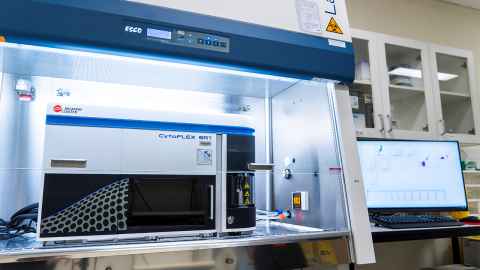Auckland Cytometry
Use our technical expertise, training and access to state-of-the-art technologies in flow cytometry.

Auckland Cytometry is a flow cytometry core facility which provides researchers with technical expertise, training and access to state-of-the-art technologies and applications in flow cytometry.
We can support your research by offering access to:
- Training to use the analysers
- Trained staff to assist with analysis or cell sorting
- Consultation or collaborations to assist with experimental design and data analyses
Flow cytometers are able to analyse several thousand cells (particles) every second, in "real time," and specialised cell sorting cytometers can actively separate and isolate cells (particles) having specified properties. Flow cytometry, typically using fluorescent probes which bind to specific cell associated molecules, allows measurements of various molecular characteristics of individual cells (or particles) suspended in a fluid stream. The use of flow cytometry can be divided into two broad categories, analysis and cell sorting.
Instruments
- Cytek Northern Lights 3 Lasers spectral analyser
- Cytek Aurora 5 Lasers spectral analyser with plate loader/tube rack
- Cytoflex SRT 4 Lasers cell sorter
- MAGPIX bead assay reader
- Curiox Laminar Wash HT2100 System (please contact us directly if you are interested in using this instrument)
1. Spectral Analysers
Spectral cytometry is an exciting new technology we are proud to host at the facility. As opposed to conventional detection, spectral cytometers lack individual detectors for the measurement of a dedicated fluorophore. Rather, a “spectral signature” is registered for each particle or cell that is interrogated, and this spectral signature is deconvoluted in order to extract intensity data for each dye. This means that we can use many more dyes in combinations not possible on conventional instruments.
Example applications on spectral analysers:
- Multicolour Immunophenotyping
- Cell lines, isolated primary cells
- Fluorescent protein detection (eg eGFP) – transduction efficiency
- Functional assays (ie live/dead /cell proliferation, cytokine secretion, receptor regulation)
- Multicolour phenotyping (at least 26 colours on the Cytek Aurora)
- Autofluorescent cell studies -primary tissue digests/cultured cell lines
- Microvesicle studies
1.1 Cytek Northern Lights
- 3 lasers (violet/blue/red)
- 38 channels (up to 28 colours)
1.2 Cytek Aurora spectral analyser:
- 5 lasers (UV/violet/blue/yellow-green/red)
- 50 channels (at least 26 colours)
Beyond tube-based acquisition, the instrument accommodates 96-well plates (deep-well, V-, U-, and flat-bottom) and tube racks that hold up to 40 5 mL round-bottom tubes, enabling greater flexibility for high-throughput applications.

2. Cell sorter
CytoFLEX SRT
The CytoFLEX SRT has 4 lasers (violet/blue/yellow-green/red) and detects 15 colours (conventional cytometry) inside a Biosafety hood for sterile sorting.
- Sort into tubes (2 or 4-way), slides, or multi-well plates (from 6 to 384 wells)
- Accurate single-cell deposition
- High recovery and post sort viability
- Small particle (e.g Extracellular vesicles) detection and sorting
Example applications:
- Single cell deposition (sorting) –cloning from single cells
- Identification and isolation of transduced (fluorescent) cells
- Molecular characterisation/functional assays
- Enriching cells of interest/depleting cells/debris

3. Bead assay reader
MAGPIX
Highly specialised magnetic-based system that reads multiplexed bead assays in biological samples.
Multiplexing allows multiple biological target analytes to be simultaneously examined and quantified in a single sample.

Policies, Services and Guidelines
1. How we can help you
- Project design/method development: We are available for consultation or collaborations to assist with experimental design and data analyses.
- Training: Researchers can be trained to use the machines themselves or pay to have an operator assist. Cell sorting will generally require an experienced operator to assist, although this can also be trained if the researcher will be performing this regularly.
2. Booking
- Equipment and services are booked through iLab until 31 October 2025.
- Bookings for dates from 1 November 2025 onwards, should be made through Infinity X.
Infinity X is the booking and billing system used to reserve research platforms equipment, services and training. For guidance on accessing or using Infinity X, visit the Infinity X guidance ResearchHub page.
3. Contact
4. Services and Collaborations
- We are available to assist you with your project. Costs, regents, technical service and sample requirement information will be supplied once we understand your needs and project.
- We are always keen for new collaborations – especially multicolour panel development, so get in touch if this is something that would advance your research.
- We are also always keen to try new techniques and help develop assays.
5. Data Storage and Analysis
Storage of data generated on any of our machines is the responsibility of the user. You will be required to take your data with you following completion of your run. We are not responsible for ensuring your data is backed up. Further instructions will be provided depending on the machine you will be using. Google Drive is an efficient way of transporting your data, as all machines will have internet access.
Data generated from all the instruments is the responsibility of the investigator, as a separate software package is often required. Data analysis is the responsibility of the investigators although training, and assistance can be provided.
6. Acknowledgments
If you are using the core facility, please acknowledge the core facility in all publications and grant applications where equipment use and/or our services/expertise were used. For example: “We acknowledge the Auckland Cytometry Flow Cytometry Research Platforms Core for…”
If a staff of the Research Platforms team has worked closely and helped you with your project, it is a good habit acknowledge this including their name in the acknowledgement section.
Send us your newly accepted papers when contain data produced at the core facility. We enjoy seeing the work that the costumers are generating here!